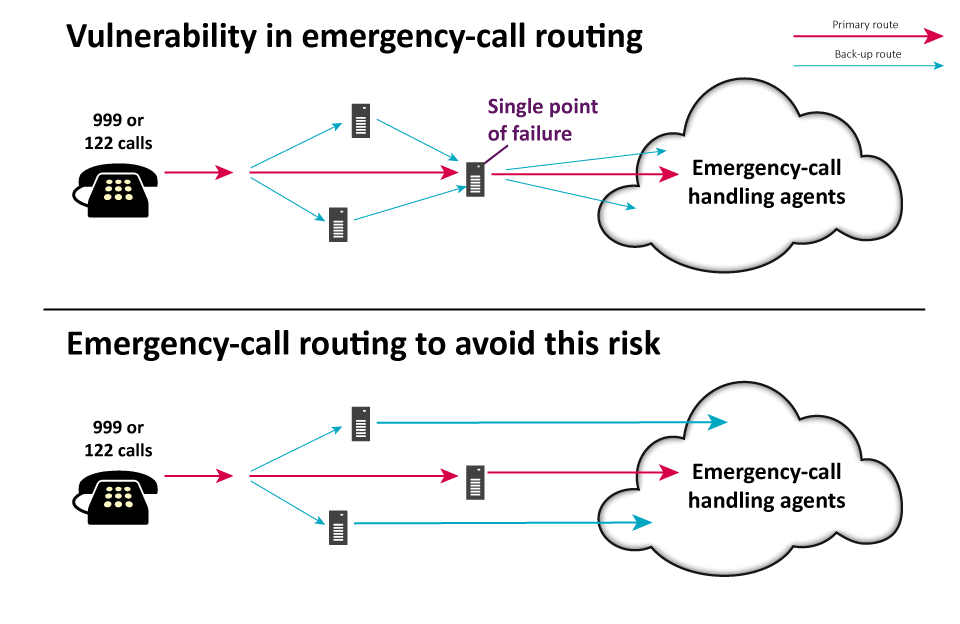Ofcom
|
|
KCOM fined £900,000 for emergency-call failure
Ofcom yesterday fined KCOM £900,000, after uncovering a serious weakness in the telecoms company’s emergency-call service.
- 74 emergency calls failed after telephone exchange flooded
An Ofcom investigation found that KCOM, which operates the main telephone and broadband network in Kingston upon Hull, broke an important rule designed to ensure everyone can contact the emergency services at all times.1 This is crucial to public health and safety.
Ofcom expects telephone companies’ emergency-call services to be resilient. They should ensure, to the greatest extent possible, that emergency calls can be connected at all times, even in challenging circumstances.
What went wrong
On 28 December 2015, KCOM notified Ofcom that its emergency-call service for the Hull area had failed for around a four-hour period.2
KCOM attributed this failure to flooding at one of BT’s telephone exchanges in York, in the wake of Storm Eva.3 As a result, 74 attempted calls to 999 or 112 from 34 different numbers failed to connect during this period.4
Ofcom’s investigation found that all emergency calls from customers in the Hull area relied on the flooded telephone exchange in York, which was a single point of failure in KCOM’s emergency-call routing.
To meet Ofcom rules, KCOM should have been able automatically to divert emergency calls via back-up routes. While our investigation found that KCOM did have back-up routes in place, it later became clear that these also relied on the flooded telephone exchange in York.5
To resolve the incident and address the weakness in its emergency-call routing, KCOM created an alternative route to carry emergency-call traffic that bypassed the flooded telephone exchange in York. It did so within two hours of identifying the problem.

For illustrative purposes only
Ofcom’s decision and financial penalty
We found that KCOM breached the requirement to ensure uninterrupted access to the emergency services, and have today imposed a penalty of £900,000. The fine reflects the seriousness of this breach, and its impact on public health and safety.
The fine, which must be paid to Ofcom within 20 working days, will be passed on to HM Treasury.
Ofcom expects all providers to continue to satisfy themselves that their networks have no avoidable single points of failure in the routing of emergency call traffic.
Gaucho Rasmussen, Ofcom’s Enforcement and Investigations Director, yesterday said:
“Ofcom rules mean that people must be able to call the emergency services around the clock.
“Any failure to connect 999 calls is extremely serious. Today's fine serves as a clear warning to the telecoms industry that it must prioritise access to the emergency services, no matter what the circumstances.”
Notes for editors
- Ofcom opened an investigation into KCOM on 11 February 2016. Evidence gathered during the course of this investigation showed that KCOM breached one of Ofcom’s rules – General Condition 3.1(c) – which requires communications providers to take all necessary measures to maintain, to the greatest extent possible, uninterrupted access to emergency organisations as part of any publicly available telephone services offered.
- KCOM’s emergency call service for the Hull area failed from 21:58 on 27 December 2015 until 01:43 on 28 December 2015.
- All communications providers interconnect with BT at locations across the country, at which point emergency calls are handed over to BT to deliver to its call handling agent centres. KCOM’s primary interconnect with BT was at the BT York Stonebow exchange, which flooded.
- During the course of the investigation, KCOM reported that the loss of BT’s York Stonebow exchange due to flooding had left people unable to make calls to 999 or 112 on 187,406 KCOM lines. The company identified a total of 90 calls that were attempted to 999 or 112 over the period of the incident (16 of which were test calls). 112 is the common emergency-call number for many EU and European states, and can be used in the UK as an alternative to 999.
- KCOM had back-up routes in place to take its emergency call traffic to alternative BT exchanges in Sheffield and Leeds for onward routing to call handling agents. However the paths that these routes took all either physically passed through the York Stonebow exchange on the way to these alternative exchanges, or the signalling associated with these paths were reliant on the York Stonebow exchange. These routes therefore also failed when the BT York Stronebow exchange flooded.
Original article link: https://www.ofcom.org.uk/about-ofcom/latest/media/media-releases/2017/kcom-fined-900,000-for-emergency-call-failure


.gif)